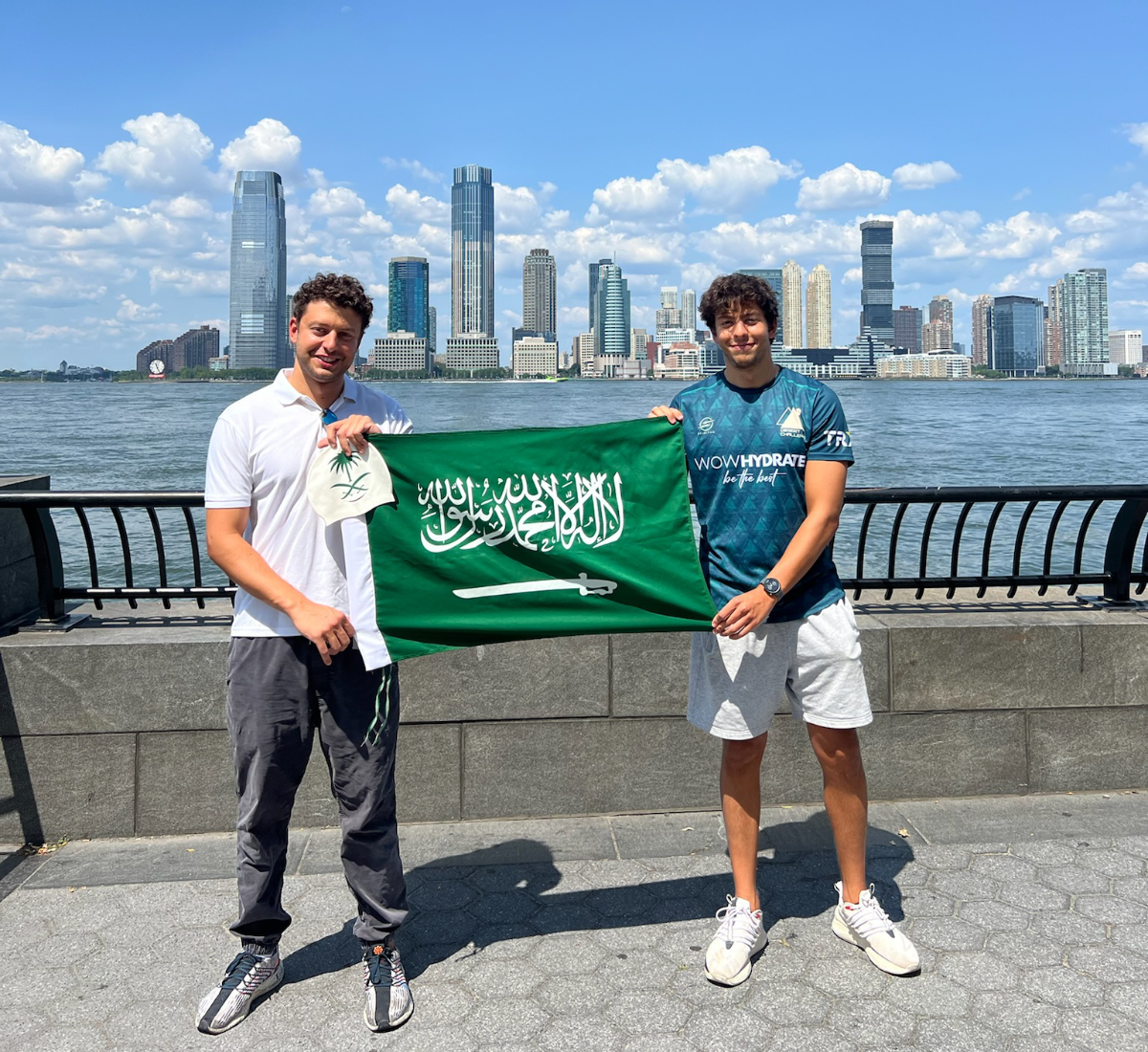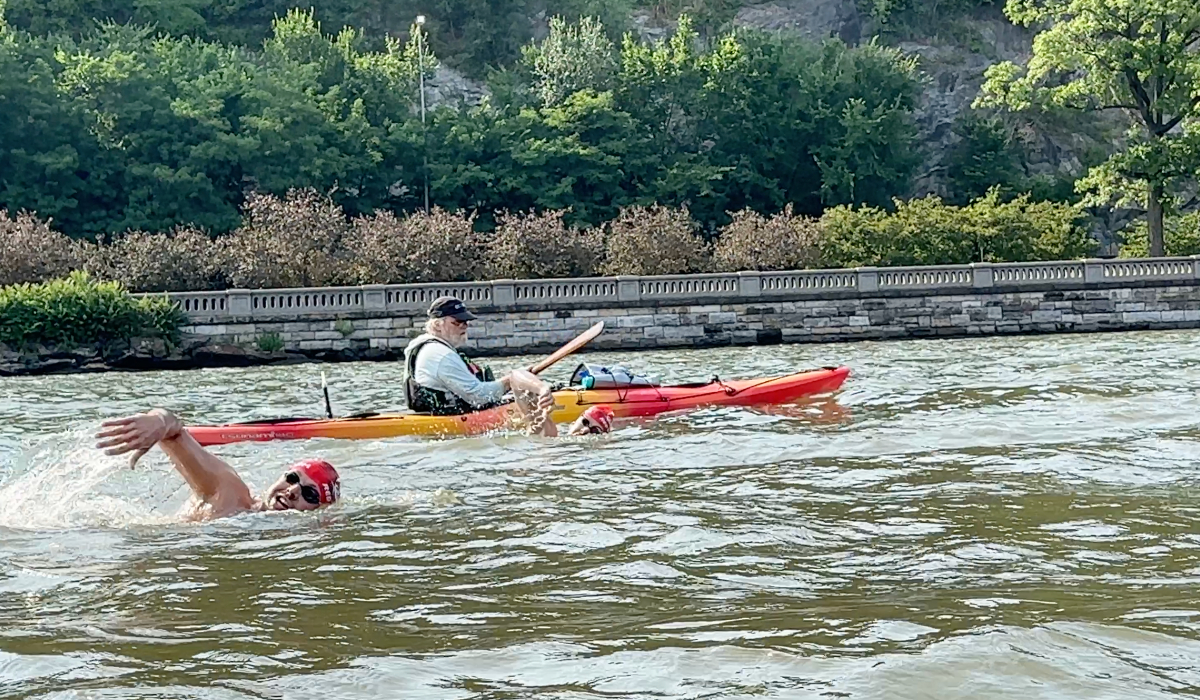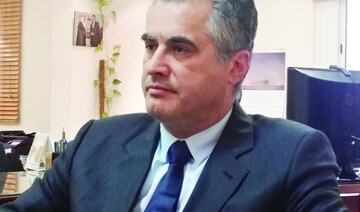RIYADH: Abdulrahman Boksmati and Ghaith Boksmati from Jeddah are the first Saudis to complete the 20 Bridges swim in Manhattan, New York.
The 48.5 km loop around the island is one of three swims that constitute “the triple crown” of open-water swimming. The title is bestowed on swimmers who complete the Catalina Channel, the English Channel, and the largest of the three, the Manhattan 20 Bridges.
Abdulrahman, who has been swimming with Ghaith for more than 13 years, completed the English Channel swim in 2021, making him only the fourth Saudi to do so — and bringing him one swim away from earning the title.

The Saudi brothers completed Manhattan’s 20 Bridges swim, a 48.5 km loop around the island, and one of three swims that constitute ‘the triple crown’ of open-water swimming. (Supplied)
Both brothers are engineers at Saudi Aramco: Abdulrahman, 26, has a degree in electrical and electronics engineering and has been working as a control engineer for three years, and Ghaith, 23, holds a degree in computer science and engineering and has been working as a networks engineer for a year.
“I have to attribute our start with swimming to our father, to our parents,” Abdulrahman told Arab News. “My father used to be a national team swimmer, and he got us (siblings) into swimming at an early age.”
While it started as a pastime, the brothers quickly picked up the sport professionally and started training with Al-Ittihad. They joined the Golden Swimmer team in middle and high school — founded by coach Abdullah Al-Jehani — participating in both local and international swimming competitions.
HIGHLIGHTS
• Abdulrahman Boksmati completed the English Channel swim in 2021, making him only the fourth Saudi to do so.
• The 'triple crown' title is bestowed on swimmers who complete the Catalina Channel, the English Channel, and the largest of the three, the Manhattan 20 Bridges.
Even though the hot Saudi climate should encourage more swimming facilities, the brothers said that growing up it was a struggle to find accessible and affordable 25-meter pools outside of schools, compounds and gyms — and this continues to be the case.
Abdulrahman said that local swimmers are often forced to seek out other clubs’ reservation times and join their sessions.

The brothers expressed their desire to continue the swimming tradition with their families in the future as well, citing its physical and psychological benefits. (Supplied)
It was during their years at university that the brothers were first introduced to open-water swimming through Red Top Swim, a UK team led by coach Tim Denyer.
Abdulrahman said that he was unhappy with the progress he had been making in swimming and during his last year at university decided that it was time for a challenge, which is how he came to swim the English Channel.
As the only prior experience that they had was in a pool — a controlled environment — one of the first lessons the Boksmati brothers learned was how dependent open-water swimming is on the conditions of the day. Swimming the English Channel, according to Abdulrahman, can “take anywhere between eight to 16 hours.”
It was very important to keep the spirits up, push each other to the finish.
Ghaith Boksmati, Saudi swimmer
Abdulrahman swam the English Channel 40 years after the last Saudi achieved this, in 1981.
While open-water swimming has not gained much traction in the Saudi swimming community, the brothers are hopeful that many more swimmers will want to attempt such challenges once word gets around, especially since age and speed are not a prerequisite.
“A lot of people I’ve seen do the English Channel would be anywhere from their mid-20s to their mid-60s. Anyone can do it if they train well enough for it,” Abdulrahman said.
The 20 Bridges swim, unlike the English Channel’s Atlantic Ocean setting, was in the middle of a bustling metropolitan city. And with city views came city troubles.
“It was the waviest water I’ve ever swam in,” Abdulrahman said, adding that the experience can make swimmers very dizzy and nauseous.
Ghaith said that because the swim took place on a Saturday, the amount of boat traffic was unusually high: “Whenever the boats pass by, it adds more waves to the mix … that slows us down.”
He explained that the combination of the waves, waft of gasoline from boats and unpleasant smells coming from some sections of the dirty water, as well as occasionally being hit by unknown foreign objects, made the eight hour and 36 minute swim a test of patience and mental endurance.
“At one point I thought maybe this is a bit too much … you’re not swimming in a pool, you’re swimming in an ecosystem,” Ghaith said.
Abdulrahman remembered the advice he was given by Denyer before the swim to get him through: “Just imagine this is your nine-to-five, eight-hour job today. Instead of control engineering, it’s swimming. No way around it.”
And most importantly, don’t look forward. “Looking toward the end defeats the purpose, it actually demotivates you,” he said. “You swim for 30 minutes and then you look up again and it’s the same view. It takes a toll on you mentally.”
However, at the end of the day, all the troubles were worth it for the experience. “Yes, there were many obstacles we didn’t account for,” Abdulrahman said, “but it was truly a pleasure, honestly, to witness Manhattan and New York from another lens, through the water.”
When asked about training for a swim like this, the brothers emphasized the importance of cold plunges to adjust the body to low temperatures.
In the months and weeks leading up to the 20 Bridges, Abdulrahman and Ghaith woke at 5am every day to practice before their workdays started, coordinating their pace as much as possible.
They also had to work around unforeseen circumstances after Ghaith suffered a collarbone fracture during a sprint triathlon two months prior to the swim and was benched for four weeks.
On a six-hour practice swim that they completed prior to the challenge to ensure their ability to handle long distances, the brothers tested the feeding schedule they would have on swim day. The feeds come in 30-minute intervals and include a mix of carbohydrate powders and fizz-free soda to keep the swimmers’ energy levels high.
They would also use this time during the swim to check in with one another. “That was very important to keep the spirits up, push each other to the finish,” Ghaith said.
When asked what drove them to keep pursuing the sport over the years, they highlighted both personal and communal motivators.
“I want to see what I can accomplish and how much I can push myself,” Ghaith said. “The problem faced by a lot of swimmers is that swimming can get boring … you’re in the water all the time, there’s no teamwork.”
Abdulrahman said that senior swimmers would hold him accountable during training by tracking his progress online and sending a “You’re going to drown in the Channel” message anytime he missed a session. Terrifying, yet effective.
“There’s a lot of inspiration from our peers,” Ghaith said. He added that the swimming community in Saudi Arabia did a good job of keeping track of one another across different clubs, achievements and phases in life, bonded by mutual admiration and the desire to constantly improve and better themselves.
In the quest for the triple crown, the brothers hope to make it a family affair by completing the English Channel as a relay swim along with their two other brothers and father later this year, an achievement that could cement the Boksmati family name as a powerhouse in the Saudi swimming community.
The brothers also expressed their desire to continue the swimming tradition with their families in the future as well, citing its physical and psychological benefits.
“It (swimming) instills a lot of good values when it comes to things like discipline, keeping your cool, being competitive, patience,” Abdulrahman said.
The brothers, along with athletes such as 16-year-old swimmer Zaid Al-Sarraj, the youngest member of the Saudi Olympic team this year, and taekwondo star Dunya Abu Taleb, the first Saudi female to qualify for the Olympics on merit without the need for a wildcard invitation, are inspiring a new generation to keep raising the bar for sport in the Kingdom.





























